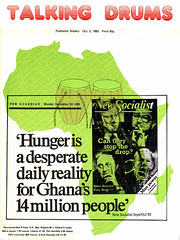Ghana Armed Forces: Legacy Of Indiscipline
by A Correspondent
But they have since 1966 thrice interfered with civil power for various reasons.
In 1979 the Junior officers and other ranks mutinied and formed a government for a period of three months and this set in its train, in discipline which has remained with the Armed Forces till to-day. When therefore, the Limann Administration took over the reins of government in 1979, it was faced with the indiscipline created by Capt. Rawlings and his team who handed power to them. The question is did the Limann administration tackle the problems in the Armed Forces in order to give security to the 14 million Ghanaians entrusted to their care? The answer on the evidence available is no.
What were the internal security problems between the time Dr. Limann became President of Ghana in September 1979, and the time of his being overthrown by Capt. Rawlings on 31st December 1981? It was always assessed to be elements with radical views who, using Rawlings, could get at the Junior officers and the other ranks to disturb the smooth running of the civilian government. What did Dr. Limann and his government do about the report?
Nothing. It is understood that up to the last week of December 1981, a report indicating that Rawlings and Tsikata had plotted to overthrow the government was submitted to the government, but still nothing was done.
This gave rise to a lot of stories. Did Dr. Limann have a phobia for Rawlings? Was he in the know about the Rawlings plot. Did he trust Rawlings to the extent that he did not believe his security officers? Events have shown that the simple answer to all the questions is that Dr. Limann and his small body of security advisors simply took things for granted and were unbelievably inept.
They could not on the morning of 31st December 1981 mobilise the whole of the Ghana Armed Forces to contain about eight men who had started the so-called Revolution. Dr. Limann simply sat around presumably shocked that his trusted friend Rawlings had let him down so miserably.
But what was the state of the Ghana Armed Forces all this. The period of 1972-79 when Ghana was under military rule rather saw the deterioration of the Armed Forces. The best Senior Officers were too busy being managers of state industries.
The Armed Forces was neglected. It had completely reduced in size, and by 1979 with all resources put together could make up only a brigade of three battalions which for the economy was a good starting point for a new government, because defence budgets are quite a drain on foreign exchange reserves. But the Army in particular had been rendered idle. They were never on exercises and morale generally was low. This continued throughout the Limann government who now seemed to have an answer to the problems they inherited and could not take a decision on how best to use the Army.
The Air Force and Navy suffered from lack of spares and were grounded most of the time. It is known that an idle Army can be dangerous.
In the particular circumstances of the Armed Forces, were they a fertile ground for subversion and why should this be possible? In 1979 certain Junior officers conspired with the other ranks to mutiny and form government. The socialist rhetoric of power to the people was introduced into the Armed Forces for the first time.
The result was that other ranks sit with junior officers to constitute the government of the day. This started the serious problem of the indiscipline. It affected the command structure with the result that to-day there is to be a disintegration of the Ghana Armed Forces. A fine institution with a proud record at home and abroad
The future of the Armed Forces is uncertain. Having been used by Rawlings in what he terms a Revolution, it looks as if it will be superseded by a People's Militia and that had already started.
There are only three events in a man's life; birth, life and death, he is not conscious of being born, he dies in pain and he forgets to live.
— D'homme
